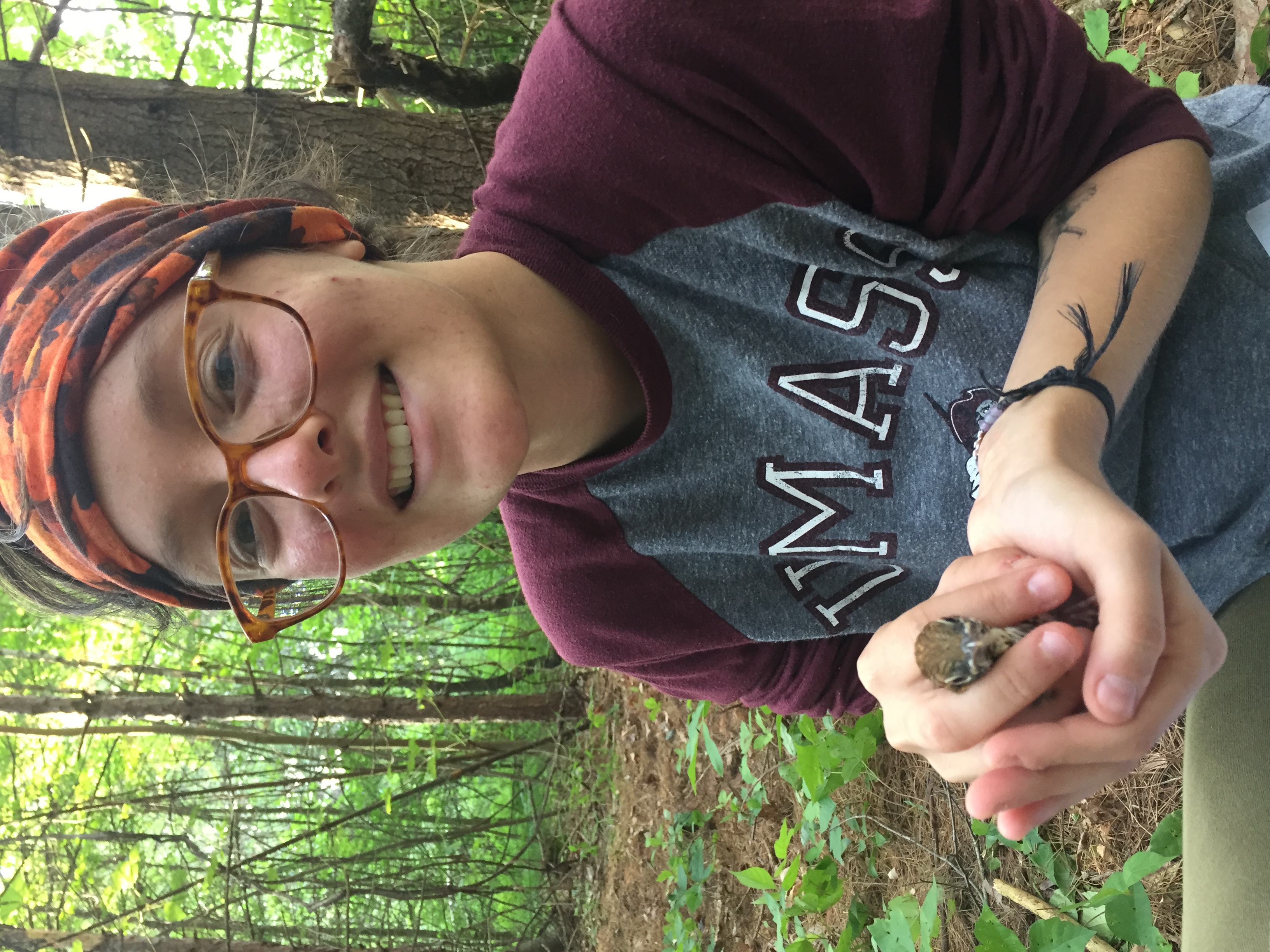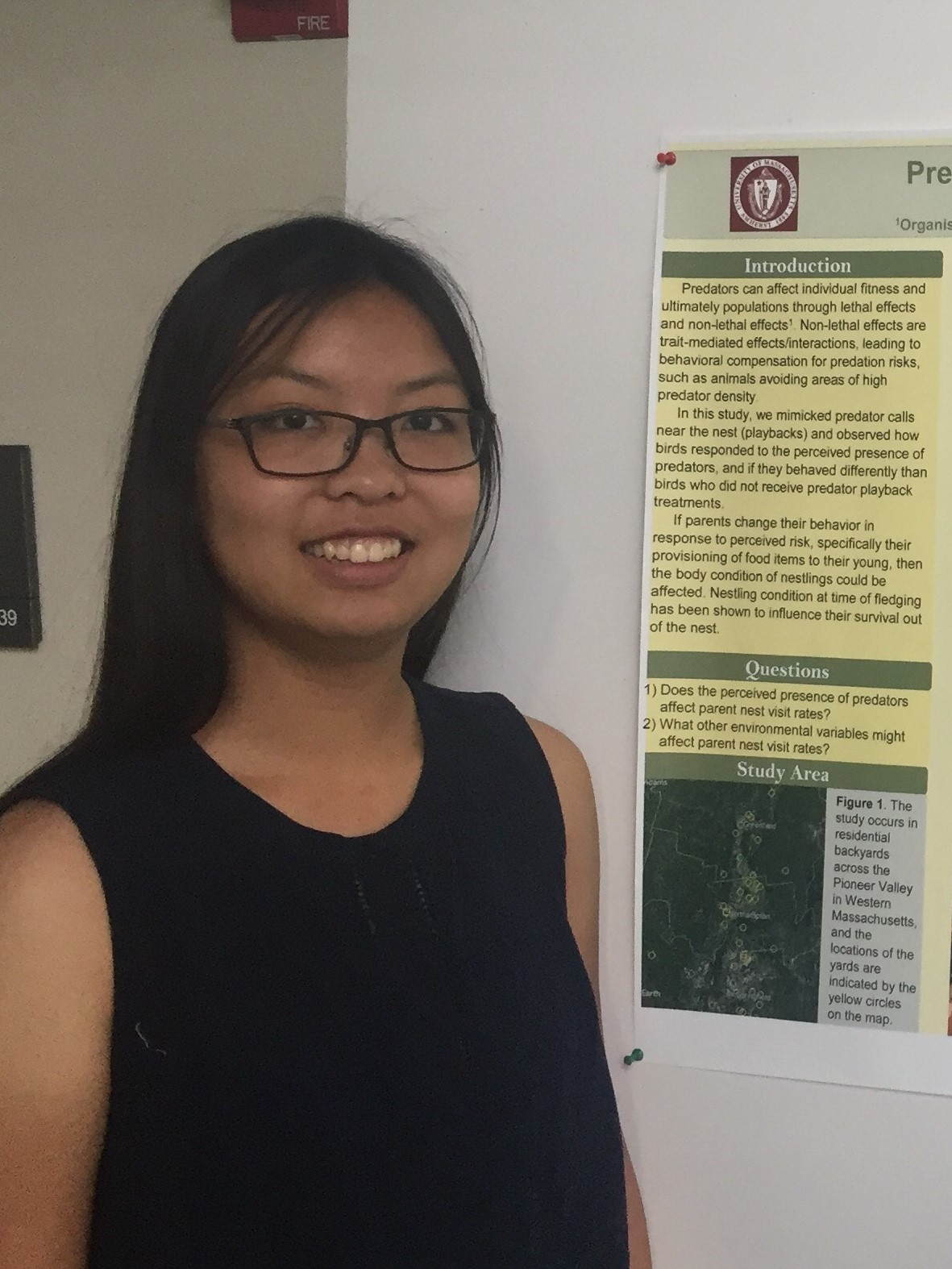Undergraduate researcher Fanny Riand won the Eagle Hill Undergraduate Student Poster Award at the NENHC/WOS conference in April 2021 for her poster titled “Correlations Between Free-ranging Domestic Cat Activity and Land-Cover Type across an Urban Gradient.” Congratulations, Fanny! She plans to continue with the research project and hopes to present a further update at the Ecological Society of America meeting in August 2021. Fanny’s research is jointly supervised by PhD student Sebastian Moreno as well as Dr. Susannah Lerman (USDA Forest Service), with warrenecologylab PI Paige Warren assisting.
Category Archives: Uncategorized
Lab alums Zhang and Berezin accepted to graduate school


Congratulations to two Warren lab alumnae who are pursuing Master’s research starting in Fall 2021.
Lucy Yifei Zhang, who conducted research on House Wrens in the Warren lab as a high school student has been accepted to the Duke Kunshan University Master’s program in environmental policy, with a focus on ecology and conservation.
Jodie Berezin, will be starting her Master’s degree at Smith College. Jodie completed a senior thesis at UMass, based on her research in Tanzania on elephant social behavior and she assisted with multiple Warren lab projects including the work with both House Wrens and Wood Thrush. We’re excited to see what the future holds for both Lucy and Jodie!
Sebastian Moreno and Aaron Grade present on environmental justice and citizen science at NENHC/WOS
Sebastian Moreno presented his research – “Motivations and Barriers: What Brings People to Citizen Science Programs?” at the NENHC/WOS conference in a session on Urban Ecology and Environmental Justice, led by alumnus Dr. Aaron Grade. Aaron also presented warrenecologylab-based research on sampling biases in eBird checklist postings – “Where We eBird Matters: Sample Selection Bias in eBird Checklist Locations by Race and Income in the Boston Metropolitan Area.”
Aaron Grade wins AAAS fellowship
Lab alumnus Dr. Aaron Grade (co-advised with Susannah Lerman) was selected to be a finalist for a AAAS Science and Technology Policy Fellowship. Aaron is currently a postdoc at Clark University. The fellowship selection process involved interviews with a wide array of federal agencies. He was selected to join the Department of Energy in an urban ecology related role and will begin his fellowship position in September 2021. Congratulations, Aaron!
Kit Straley’s science journalism in action
Kit completed a US Fish and Wildlife Service Directorate Fellowship this summer. Among her many accomplishments is this article on the work the Service biologists are doing on coastal marshes and endangered marsh sparrows. https://storymaps.arcgis.com/stories/308db7dec4d34d788705294da0f441f6
Aaron Grade is now Dr. Grade

This is a much belated congratulations to Aaron Grade (co-advised with Dr. Susannah Lerman) who successfully defended his dissertation via zoom (COVID quarantine-style) on July 15, 2020. He has begun a postdoc at Clark University with Dr. Rinku Roy Choudary at Clark University.
Aaron Grade takes 1st place on a talk at ECoGSS!
The third annual ECo Graduate Student Symposium (ECoGSS) was held on Friday February 28. This student-run event showcases graduate student research from the Department of Environmental Conservation and affiliated programs here at UMass. Our own Aaron Grade won first place in the traditional format talk category, for his presentation on: “Mammalian species richness and community composition varies in residential backyards across an urban gradient.” Way to go, Aaron!
Lohitha Madhireddy blog post is published!
Warren lab undergraduate researcher Lohitha Madhireddy wrote and published a post for the That’s Life [Science] blog, reflecting on the research she did in the lab. In it she asks, “Have you ever wondered why some streets in your city or town have more trees than others?” She reports on findings from multiple studies showing greater access to biodiversity in wealthier parts of cities. Comparing across these studies, she finds a lot of “complexity and nuance” in relationships among race, income, and biodiversity. Great job, Lohitha, and a big thanks to Evan Kuras and the staff of That’s Life [Science] for supporting her efforts.
New Warren lab publication finds declining bird species in Phoenix
New publication from the Warren lab and colleagues is highlighted by NSF:
https://www.nsf.gov/discoveries/disc_summ.jsp?cntn_id=297720&org=NSF&from=news
New article in special issue on urban evolution
![]() Paige co-authored one of 16 articles in a special issue on urban evolution in the Proceedings of the Royal Society: http://royalsocietypublishing.org/cc/the-evolution-of-city-life
Paige co-authored one of 16 articles in a special issue on urban evolution in the Proceedings of the Royal Society: http://royalsocietypublishing.org/cc/the-evolution-of-city-life
The editors produced a nice blog post about the special issue: http://blogs.royalsociety.org/publishing/the-evolution-of-city-life/
Collectively, the editors say, “papers in this Special Feature highlight the power of cities as a globally replicated experiment that provides an unparalleled opportunity to understand how human-altered environments, and particularly cities, affect the evolution of life around us. In this context there are three take-aways from the 15 papers published in this Special Feature. First, studies on ants, plants, birds, and bees have all shown that cities frequently alter natural selection. Second, this altered selection frequently leads urban populations to be better adapted to cities than their nonurban counterparts, an effect which is often consistent across different cities. Third, the development of cities has given rise to new human commensal species, as in the case of house sparrows, which have evolved to thrive on starch-rich diets commonly found in human-dominated landscapes.“
Our contribution shows that species interactions like pollination can play a role in mediating effects of natural selection on plant traits. However, these effects are sometimes rather modest, and the strength of their effect on natural selection can vary from year to year.
